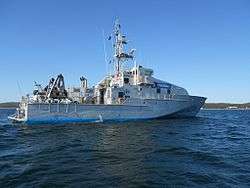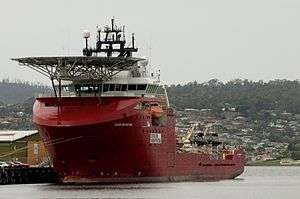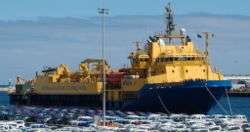Marine Unit (Australian Border Force)



The Marine Unit, formerly the Australian Customs Service National Marine Unit, is a division of the Australian Border Force which acts as a Coast Guard in guarding Australia's coast. The Marine Unit focuses on surveillance and response activities within the Australian Economic Exclusion Zone (EEZ), and the operation and training of ships and crews to do so.[1]
Operations
The CMU and the Border Protection Division (formerly known as Coastwatch) make up the Customs contribution to Maritime Border Command, a joint command with the Australian Defence Force and incorporating assets from the Australian Fisheries Management Authority, the Australian Quarantine and Inspection Service, and state-level agencies.[2] Maritime Border Command is responsible for protecting Australia's maritime areas, offshore assets, and external territories from threats, including the exploitation of natural resources, people smuggling, importation or exportation of drugs and other illegal items, piracy, and terrorism.[2]
Ships
The primary vessels operated by the CMU until 2013 were eight Bay-class patrol boats. The 38-metre (125 ft) oceangoing patrol boats (ACVs Roebuck Bay, Holdfast Bay, Botany Bay, Hervey Bay, Corio Bay, Arnhem Bay, Dame Roma Mitchell, and Storm Bay) are used to patrol the northern extension of the Australian EEZ and Australia's offshore territories.[1] These vessels were due to be replaced in 2010, but it was not until June of that year that a request for tender was issued for eight larger patrol boats designated the Cape class, which entered service in 2013.[3][4]
Several larger vessels are chartered by the CMU to supplement the Bay class boats in the patrol and protection roles. The 98-metre (322 ft) trimaran ACV Triton operates in northern waters in an individual capacity, but can also be used as a command vessel for Maritime Border Command operations.[1] ACV Ashmore Guardian is a 35-metre (115 ft) vessel converted to patrol and monitor the Ashmore and Cartier Islands and their attached marine reserves.[1] MV Oceanic Viking, a 106-metre (348 ft) former cable layer was used to patrol the Southern Ocean, Australian Antarctic Territory, and the territory of Heard Island and McDonald Islands until mid- 2010.[1] Oceanic Viking's replacement, ACV Ocean Protector (the former Norwegian vessel MV Skandi Bergen), entered service in November 2010 following modification.[5][6]
ABFC Thaiyak is a 40-metre (130 ft) vessel delivered in June 2014 [7] intended to replace the Ashmore Guardian.
In addition, charter arrangements give Customs access to an additional twenty vessels of various sizes and types; these are called on when required to transport apprehended foreign fishermen and illegal entrants, or tow captured vessels.[1]
Ships operated by the CMU are referred to as Australian Customs Vessels (ACVs).[1]
References
- 1 2 3 4 5 6 7 "Customs Marine Unit". Australian Customs and Border Protection Service. 21 May 2008. Retrieved 1 March 2010.
- 1 2 "Border Protection Command". Australian Customs and Border Protection Service. 8 February 2010. Retrieved 1 March 2010.
- ↑ Australian Security Magazine, Govt to buy new border patrol vessels
- ↑ Parnell, Navy and Customs vessels cut back on border patrols
- ↑ Kerr, Julian (16 December 2010). "Australia stands watch in the Southern Ocean with launch of Ocean Protector". Jane's Navy International. Retrieved 18 December 2010.
- ↑ Parnell, Sean (30 July 2010). "Mothership being readied for asylum seekers". The Australian. Retrieved 5 November 2010.
- ↑ "Strategic Marine Delivers MV Thaiyak".
- "Govt to buy new border patrol vessels". Australian Security Magazine. 23 June 2010. Archived from the original on 4 March 2011. Retrieved 16 July 2010.
- Parnell, Sean (26 July 2010). "Navy and Customs vessels cut back on border patrols". The Australian. Retrieved 5 November 2010.